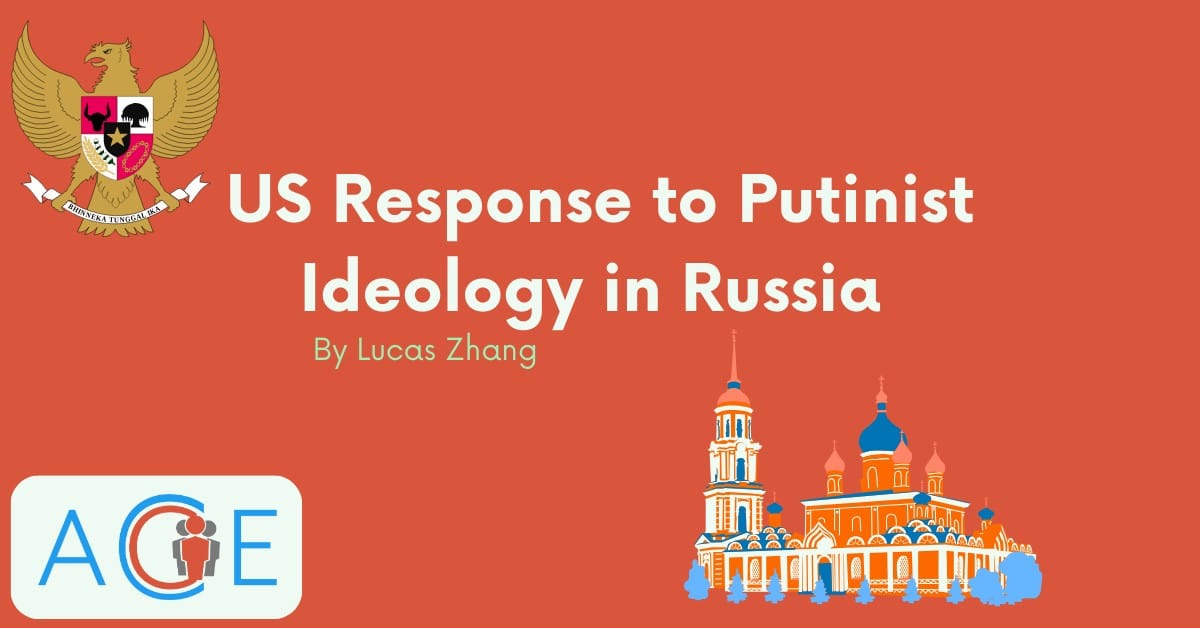Introduction
Amid Russia’s ongoing conflict and occupation of Ukraine, the underlying motives driving the war have become increasingly evident. A significant focal point has emerged around the personal aspirations and geopolitical perspective of Russian President Vladimir Putin. Putin’s authoritative leadership style has positioned him as a central figure in Russia’s actions and choices, where his personal beliefs and principles influence the direction of the nation he governs. Upon dissecting Putin’s ideology, it becomes apparent that his system is inherently antagonistic toward the United States and its allied nations. This hostility stems from the foundational principles on which his ideology is constructed, as well as the broader objectives it seeks to accomplish beyond the confines of Russia’s borders.
Characterizing Putinism:
Vladimir Putin’s ideology, often referred to as Putinism, does not adhere to a rigid set of traits that dictate all of Russia’s actions. Putin’s nearly quarter of a century rule has seen Russian politics change drastically as the democratic system established after the dissolution of the Soviet Union has been gradually replaced by an authoritarian system headed by Putin. However, recurring principles in the domestic and international spheres can be identified.
Domestically, Putinism’s most prominent characteristics are authoritarianism, political illiberalism, and social conservatism. In practice, this manifests as a political system in which Putin leads as a strongman with his party, United Russia—a loyal state security apparatus—and various allied oligarchs wield control over the media, internet, economy, and political process. Civil rights are curtailed while rights of marginalized groups, such as the LGBTQ+ community, are met with open hostility.
Internationally, Putinism can be categorized by three characteristics:
These principles are significant because all three characteristics build upon and sustain one another, and they are fundamentally opposed to and hostile towards the United States and its allies. Each of these principles offers a lens through which Russia’s foreign policy can be understood.
Eurasianism
Eurasianism is the concept that Russia, as well as the other former members of the Soviet Union and Russian Empire, comprise a distinct civilization separate from Europe. This “Eurasian Civilization” has been the result of Russia’s history as a site of conquest for various nomadic empires including the Huns and the Mongols. A core principle of Eurasianism asserts that ideas originating in the West, including those stemming from the Enlightenment, are inherently detrimental to Russia’s Eurasian civilization. As a result, proponents of Eurasianism advocate for the rejection and active opposition to these Western-born concepts.
A significant aspect of Russian foreign policy is the Eurasianist perspective regarding the inevitable consolidation of states within the Eurasian civilization into a unified Eurasian state under Russia’s leadership. This viewpoint gained recent prominence, as evidenced by a foreign policy charter released by the Kremlin in March of this year. The charter identified Russia as a “unique country-civilization” and a prominent Eurasian power, asserting its role as the destined leader of the “civilizational community of the Russian world.”
The Eurasianist component of Putinism contributes to its adversarial stance toward the United States. Through the Eurasianist perspective, opposition to the United States and its allies is seen as crucial to safeguarding the integrity of the Eurasian civilization against the encroachment of Western influence. Consequently, this viewpoint transforms the rhetoric of conflict with NATO from mere propaganda into a genuine ideological belief held by Putin’s Russia.
Russian Nationalism
Putin’s nationalism draws heavily from the veneration of two predecessors of the Russian Federation: the historical Russian Empire and the Soviet Union. The prestige, power, and legacy of both states are central to Putin’s particular brand of nationalism.
Having served as a former officer of the Soviet KGB, Putin holds a distinct reverence for the legacy of the Soviet Union, even describing its collapse as the most significant calamity of the 20th century. This sentiment has left a lasting impression on Putin’s Russia. Notably, the Soviet Union’s victory over Nazi Germany remains a pivotal aspect of the new national narrative Putin aims to construct. During Putin’s leadership, this triumph has been integrated into the core identity of contemporary Russia, serving as a cornerstone in framing the nation’s present actions. This was particularly evident in Putin’s initial justification for Russia’s incursion into Ukraine, which he described as an effort to “denazify” the country. By branding adversaries as Nazis or Fascists, support for Russian actions is spurred through an emphasis on Russia’s Soviet legacy. This narrative positions these actions as a continuation of the Soviet struggle against Nazi Germany, thereby generating support for Russia’s activities.
Russia’s historical antecedents have been leveraged not only for domestic propaganda but also as a rationale for its aggressive actions towards neighboring countries. Notably, Russia’s actions concerning Ukraine and other nations like Georgia can be interpreted as components of a wider aspiration to regain the status and influence once held by the Russian Empire. Putin himself has articulated this sentiment on various occasions, drawing parallels between his leadership and historical figures such as Peter the Great. In these instances, he draws analogies between Peter the Great’s extensive territorial expansion of Russia in the 17th century and his own engagement in the conflict in Ukraine, illustrating a perceived continuum of Russia’s pursuit of power and territorial influence.
Anti-Americanism
While the Soviet Union’s anti-Americanism and broader anti-Western sentiment were rooted in the ideological contest between capitalism and communism during the Cold War, Putin’s Anti-Americanism within Putinism adopts a unique character influenced by the Eurasianist perspective on the West. Under this framework, Western Europe and the United States are perceived as embodying inherent malevolence that demands a defensive posture. It is notable that despite this departure from the Soviet era, Putinism maintains the Soviet anti-imperialist narrative within its Anti-Western standpoint. In practice, Putinism adeptly integrates both Eurasianist rhetoric and anti-imperialist arguments to rationalize Russian actions. By referencing previous interventions in regions like Yugoslavia, Iraq, and Libya, this form of Anti-Americanism portrays Russian actions as a counterforce to American imperialism, positioned to safeguard the interests of the developing world.
Putinism’s anti-Westernism and anti-Americanism inevitably places Russia on confrontational grounds with the United States and its allies. The centrality of hostility towards the United States and its allies in the ideology of a robust military power which has already demonstrated aggressive action in Ukraine makes the real world implications of Putinism a particularly relevant threat.
Charting the Implications for the United State’s and the American Response
In broad strokes, Putinism aims to dislodge the current world order. Russia’s invasion of Ukraine is the most direct implementation of this aim. However Russia is also seeking to accomplish this goal by sowing internal discontent in the United States and its allies as well as expanding influence in states and regions with animosity towards the United States and the West. West African states which were previously French colonies have been the strongest examples of this method. Amidst coups and increasing hostility towards France, various states in West Africa have become increasingly aligned with Russia. The Wagner Group, a mercenary group with links to the Russian government, has established a presence in countries such as Mali.
The Russian invasion of Ukraine has stood out as a prominent realization of Putinism’s objectives. However, the American response to this invasion can be viewed as a notably successful strategy for countering Russia’s ambitions. Specifically, the provision of consistent military assistance to Ukraine before and during the ongoing invasion has yielded favorable outcomes. The resilient resistance put forth by Ukraine has significantly strained Russia’s capacities and triggered a weakening of its military legitimacy. This setback has hindered Putinism’s objectives.
The persistent pressure stemming from Russia’s involvement in the conflict in Ukraine has introduced substantial challenges to the nation’s stability. Consequently, this strain has impeded Russia’s ability to pursue other avenues for advancing its objectives, including efforts to destabilize regions and cultivate relationships with countries harboring tensions towards the United States or its allies.
Future Outlook
Perhaps the most peculiar outcome of Putinism so far is its potential impending self implosion. Failure to secure a swift victory in Ukraine has delegitimized the aims and rhetoric of Putinism internationally. More damningly, the strain which the war has put on Russia internally is perhaps the biggest sign that Putinism is already in decline. The lack of response by Putin to the Wagner Group rebellion in June of this year demonstrated how significantly Putin’s rule, and by extension Putinism, has been weakened by Ukraines steadfast resistance. Thanks in large part to the continuing material support to Ukraine, which enabled Ukraine to fend off Russia’s military, the initial actions necessary to defeat Putinism have perhaps already been put into place by the United States and its allies.


